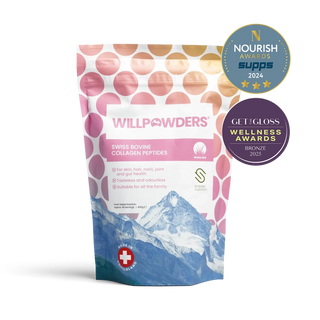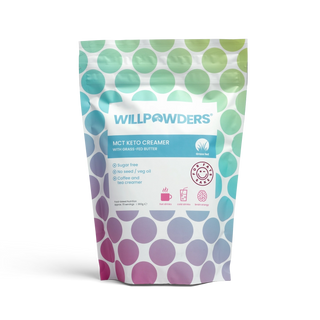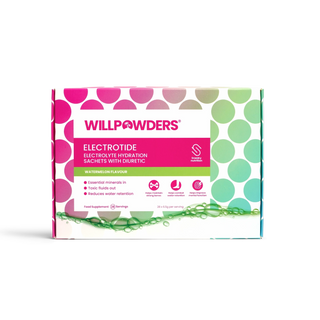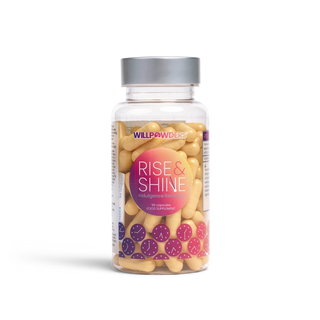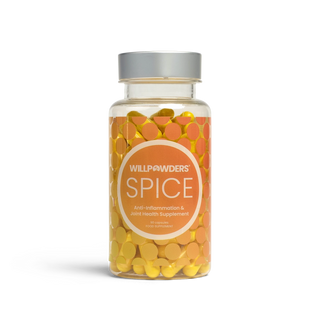
Your Proteins Need Amino Acids: The Ammo for Life
Let’s do the roll call: immune system, muscle metabolism, blood sugar levels, energy metabolism, absorbing micronutrients, brain chemistry, sustaining a healthy digestive system, collagen production, (take a breath), blood clotting, metabolising fat, nitrogen balance and happy hormone production. These are just a few of the things we need amino acids for. Clearly, they’re pretty industrious on our behalf at, you know, keeping us alive and well! Attention must be paid! And yet, …
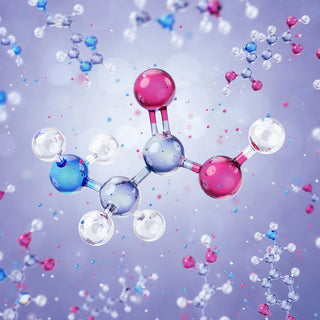

(NB: WillPowders service will resume shortly!)
Bear with us while we spend a moment talking to you as if we were any other wellness blog - dry and textbook like. Don’t worry, we won’t keep it up for long (because we can’t), but we do need to make a point.
Humans need 20 amino acids in order to stay well. We either make these amino acids or we consume them, depending on whether they are classed as essential or non-essential (yes, WillPowders HQ are aware that tumbleweed is rolling across the desert in this section of the blog - bear with!).
- The 11 non-essential amino acids are the ones your body can make, even if they are also found in your diet.
- The 9 essential amino acids are the ones that your body can’t make - you have to consume them from the external environment. If a food contains all nine of these nutrients, it is called a complete protein.
(Stay with us, not long now …)
- There are 7 conditional amino acids, sometimes called semi-essential amino acids, that are ‘usually not essential, except in times of illness and stress’ [*]
Ok, WillPowders is back in the room! Thank heaven!
That information is recycled countless times on the internet. But the truth about amino acids is somewhat different. You see, all those distinctions of essential, non essential and so on, are in place, and have been for a long time, BUT, in the scientific literature, this categorisation was acknowledged as a concept that ought to be held lightly in 1947 by the very scientists, Womack and Rose, who categorised amino acids in the first place, ‘“We have emphasized on several occasions … that the classification of an amino acid like arginine or glutamic acid as dispensable [non essential] or indispensable [essential] is purely a matter of definition.” [*]. Oh, so it’s not quite so straightforward …
The article Dispensable and Indispensable Amino Acids for Humans appearing in the Journal of Nutrition in 2023, but having been first available in 2000, also reminds us that this neat parcelling up of amino acids is arbitrary, ‘despite the longevity of the convention, as more information has become available, the distinctions between dispensable and indispensable amino acids, at least at the metabolic level, have become increasingly blurred [*]’. It seems, then, that we may need to let the sands shift beneath our feet. (We’re hoping they’re tropical sands, obvs!).
While other wellness sites might just offer that dry initial explanation of amino acids, once again WillPowders has got you and offers you an alternative WillPowders Way. But, first, let’s stick with how things get complex if we go along with that more conventional thinking of dividing amino acids up into essential and non essential.
11 + 9 = 20.
That’s 11 non-essentials that our bodies should be able to cater for on our behalf and 9 that we must eat. Lovely - nothing more satisfying than a well-done sum! So far, so amino acids good.
But, where the heck are those other 7 ‘conditional amino acids’ coming from and what the heck are they doing? Suddenly, the numbers aren’t stacking up. The more we researched, the more disagreement we found on which of the ‘non-essential’ amino acids become conditionally essential. Technically, those 7 (or 8 or 9, or 10, or you get the drift) amino acids are in the original sum, they were just part of that set of 11 non-essential amino acids that we can make for ourselves, if the going is good and all things are textbook.
But, if things aren’t textbook (and whose busy life is all of the time?), to complete the sum to get the 20 could look more like 4 + 16 = 20 or 2 + 18 = 20, with that bigger number representing those amino acids that would traditionally be essential PLUS some of those that are traditionally non-essential now joining the ranks of the essential amino acids gang. Remember, they're the ones where you’ve gotta scoff ‘em to get ‘em!
You see, then, that the odds of wellness where amino acids are concerned, if we are ill or stressed, are now more reliant on what we eat than ever. But, hey, we hear you cry, how often do people get ‘proper poorly’, unless it’s the man flu? Not that often, we agree. And so it might be that we can venture into territory such as, stick a good steak on the old weekly shopping list after a bout of the ‘flu and we surely have it covered? Answer: possibly, if all things are otherwise equal for those of us living in that place called Medical Encyclopedia. Population: Not So Many of Us.
Deciding conclusively which non-essential amino acids we need to treat more like essential amino acids, or whether we should even be relying on the notion that they subdivide neatly into these categories is not something that science has fully agreed on yet at the metabolic level. And besides, we now know there is an interdependency between amino acids, some being precursors to the making of others in our body. We bet you can guess where we are going with this … That’s right - while we’re all waiting for science to catch up with our gut feeling, and realise that most modern lives come with an unhealthy side order of stress, it might be of benefit to consider eating proteins, that have all the amino acids - essential or otherwise - that we need to get on with life-ing!
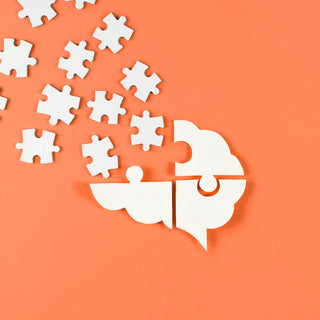

Let’s step out of Medical Encyclopedia World and take a trip to Real World
The evidence exists that illness or stress can make some non-essential amino acids conditionally essential to eat. ‘Clinical symptoms may appear during states of inadequate intake of essential amino acids, such as vomiting or low appetite. These symptoms may include depression, anxiety, insomnia, fatigue, weakness, and growth stunting in the young. These symptoms are mostly caused by a lack of protein synthesis in the body because of the lack of essential amino acids. Adequate amounts of amino acids are necessary to produce neurotransmitters and hormones, muscle growth, and other cellular processes’.[*].
Stress: the Enemy Within
We can’t stress this enough: stress really is the enemy within. Let’s say that we are scoffing protein, but our lives are too busy for comfort so we are living with stress. We live in times in which we are in danger of hearing the word stress and discussing our own stress, but still managing, somehow, to regard stress as something outside of ourselves - as if a stressful life is merely an exhausting external thing, rather than a life that affects us internally, both in mind, brain and body. The word ‘stress’ seems to have lost some of its meaning for us, so ubiquitous is it to modern life.
In ‘The Evolution of the Stress Concept’, Hans Selye reminds us, ‘“Mental stress is not a vague concept somehow related to the decline in the influence of traditional codes of behaviour, dissatisfaction with the world, or the rising cost of living, but (…) clearly a definable biological and medical phenomenon the mechanisms of which can be objectively identified” [*]. Additionally, in the saucily titled, ‘Acute and Chronic Mental Stress both Influence Levels of Neurotransmitter Precursor Amino Acids and Derived Biogenic Amines’, (ok, so we admit, it’s not such a saucy title) the authors Hufner et al, bring us to the awareness that, ‘The term “stress” has often been used to describe a black box hiding the mechanisms promoting mental health problems but actually there are some exact biological mechanisms underlying mental stress and its association with mental and physical disease [*].
The emboldening is our handiwork here at WillPowders - ‘exact biological mechanisms’ means these mechanisms are utterly measurable and quantifiable and, guess what, the effects of stress can be measured in your amino acids.
So, while HR departments up and down the country might glibly shake your occupational health report at you and crow that it states that stress isn’t an illness in itself, your body certainly reacts to stress not only in the nervous system (which generally means the hells of anxiety and low mood or depression for your mind) but at an organic molecule level which means a system full of stress hormones such as adrenaline, cortisol and glucagon.
Let’s not forget, these hormones are potent chemicals with specific jobs to do in your body to get you through short term situations. You only need to think about the fact a medic will inject adrenaline straight into the heart of a flatline patient, to understand the powerful nature of such hormones. But, stress hormones evolved for short term stress, not the prolonged boiling of the frog that many of us (particularly culturally true for women who have been trained by society in general to internalise and keep putting up and shutting up) are affected by.
Once you start reading the fine print, you learn that adrenaline, glucagon and cortisol negatively affect protein synthesis and amino acid metabolism in skeletal muscle. In tests, amino acid supplementation while stress hormones are high, prevented the decrease in skeletal muscle protein synthesis. You can take a peek at that study here [*]. Muscle breakdown can be tickety-boo, if you are in the gym lifting weight loads that are stressful to lift - you want some breakdown in the muscles to increase muscle mass when they rebuild, but it’s not so great if you are just whizzing about your daily life with a set of stress hormones interrupting protein synthesis. That’s because, for increased years in health, we would aim to increase our muscle mass. But, our bodies make proteins for all sorts of reasons beyond making muscles and we tend not to want those processes interrupted.
The potential consequences of stress on amino acids such as tyrosine and tryptophan can be problematic for brain function and cognition, according to these findings, ‘CNS [Central Nervous System] requirements for specific amino acids during periods of undernutrition or when individuals are exposed to highly stressful conditions may be particularly critical’. [1]
If your body is under prolonged stress caused by, well, anything that your body perceives as stressful: stressful social interactions, jobs, unresolved trauma, injury recovery, illness, overwhelm, busy-ness stopping you taking time to downshift stress, then your nervous system is likely to be sending out signals to keep you high in stress hormones such as cortisol, adrenaline and glucagon.
Living with and ignoring prolonged stress, as if it is just part and parcel of life, means our cells are stressed for long periods of time, leading to anxiety, depression, digestive problems, muscle tension and pain, sleep problems, weight gain and problems with memory and focus [*]. This comes as no surprise, when you remember that humans are systemic beings and our cells and chemicals are symbiotic. Worthy wellness tells us to divide ourselves up into parts and that does us no good at all, long term. Treating stress as something that happens to either the mind OR the body misses the point entirely.
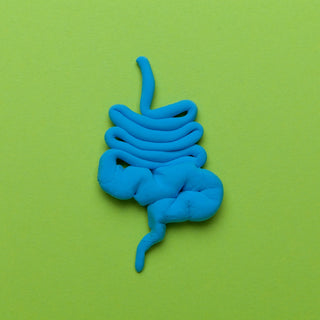

Could a healthy gut, better sleep and better mood begin to reverse cell stress?
We tend to want to reduce stress by dropping things in the external world or jumping to the other extreme of adding to our stress by trying to find the time to meditate more. But, what if we give ourselves another choice and go some way to interrupting the body’s stress response by helping our body to combat stress hormones from within, while we start to look at ways we can calm the external too? Calming the external is often the hardest to do - we’ve got to work, we yearn for play, we have to parent or spouse or be the elderly parent’s parent, all the while trying to crawl towards a dream of our own. Let’s get the incremental gains in the easiest way possible internally while we downshift stress in the external where we can over a longer length of time. We’ve said it before, and we’ll keep on banging the drum: amino acids play an important role in a healthy gut (hello glycine), better sleep (we salute you, tryptophan) and better mood (glycine, tryptophan, tyrosine, glutamine, take a bow). Support your body with these amino acids and you might be starting a chain reaction in which the stress hormones don’t necessarily deplete your body’s ability to keep your tum, shut eye and sunny disposition in play. That way, you have three foundations with which to create a platform from which you can begin to consciously uncouple from external stressors.
Let’s look at a plan to amp up all your amino acids, calm the mind and soothe the nerves and begin to sort and sift external stressors, where we can, from your day.
When enough might not be enough …
Don’t make it more complicated than it needs to be. Carrying about the idea that some amino acids are more essential than others is an idea that even the scientists who classified amino acids as indispensible/dispensible didn’t like how their idea had been interpreted. Think about the broad spectrum of eating full proteins. If we trust ‘guidelines’ on our protein RDA, then there’s a chance that we’re not eating enough. According to one review study on protein: ‘Humayun et al suggest that a range of 0.91–0.99 g/kg/day is recommended for sedentary adults, which is 12–20% higher than current recommendations’ and further work by those same scientists went on to suggest even higher numbers, under different measures, for sedentary people, suggesting ‘the ideal protein intake for healthy adults ranged between 0.92–1.2 g/kg/day. These values are 15% to 50% higher than the existing RDA recommendations of 0.8 g/kg/day’ [*]. Naturally, guidelines in countries differ slightly, but appear to be under these findings at 0.75 - 0.8g/kg/day. Plus, there is recognition that older adults require even more with RDAs sometimes around 1g/kg/day. So, wherever you look, the figures conflict.
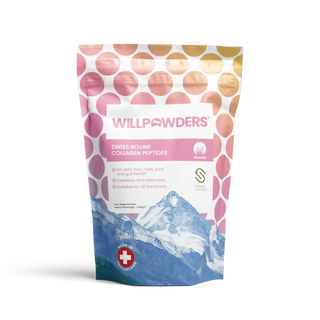

Pop another protein portion in your day
Pop another portion of nature’s quality protein in your day: smoked mackerel for breakfast or lunch (feels suitably decadent, right?) or scoff an extra chicken thigh or don’t be caught without nuts in your fist mid-afternoon (peanuts, almonds, pistachios) or stick some beans in stew or casserole - consider butter beans in all their blonde, pebble size loveliness! Meanwhile alongside the course of your eating day, you could add a spoonful of our no nonsense, Award Winning Bovine Collagen Peptides to your drinks and foods. Simple to do and avoids additional stress of keeping an amino acid register.
Sugar Free Protein Zones
Dodge any proteins that come with added free sugars and artificial sweeteners as reasonably often as we can - so swerve the protein bars at the gas station. They won’t make friends with your gut in the first instance and there’s no point in storing up trouble! Read more about that here.
Back against the wall for time and need a highly palatable sweet protein comfort stop? When we are stressed, our brains crave the sweet-fat combo which can lead to us hoovering up a chocolate bar. Instead, try one of our range of WillPowders Bone Broth Protein Powders for the full supplement picnic of offerings in terms of the amino acids for your body’s protein requirements.
Nitrogen and You
Consider the idea that researchers are exploring that, even those who have ‘protein intakes that are just sufficient to maintain body protein equilibrium’ may still be missing a nutrient, ‘metabolic nitrogen itself, rather than any single amino acid, may be the limiting nutrient. In other words, because nitrogen is in short supply, the ability of the organism to synthesize amino acids may become compromised to the extent that nonessential amino acid intake could become limiting. This might be particularly applicable to conditions associated with the consumption of low quantities of so-called high quality proteins (i.e., proteins that are well balanced for protein deposition and hence with a high indispensable amino acid/dispensable amino acid ratio)’ [*]. For nitrogen rich foods munch your meat, fish, dairy, spinach, beans, peas, radishes and rhubarb.


Avoid guilt and blame
They’re pointlessly stressful emotions. As we read about how amino acids interact in the human body, we become increasingly aware that we may not be able to remember when we last consistently nailed eating quality protein daily, because all of us are fairly certain that left over chicken nugget from the little squid’s Mc-meal that we popped in our Mc-mouths probably doesn’t count long term. No judgement - just press reset and jump back on the wagon. Just get on your WillPowders Way to supplement your building blocks of life.
Slap Dash and Compass(ion)
We’re a company that understands that, since most of the modern treadmill of life can be stressful, thinking that each scoop of collagen or protein powder needs to be accompanied with deep ancient ritual can just add more aspirational lifestyle pressures. With us, you can slip it in for sneaky nutrition and not even clean up the spills. It’s ok, we don’t judge you. The ancient ancestors forgive you! We make sure that we’ve been reverential to the animals that make up our protein products in the way that they were farmed - in Switzerland and Scandinavia on a diet of grass and respect so that you can just focus on getting the amino acids in to potentially give your body some ammo.
It’s a family affair!
Don’t forget the family in all this, too. Biochemists tell us that, ‘amino acids such as arginine and histidine may be considered conditionally essential because the body cannot synthesize [sic] them in sufficient quantities during specific physiological periods of growth, including pregnancy, adolescent growth, or recovery from trauma’ [*]. If anyone in your family ticks the growing box, is becoming elderly, or is up against it with stress, then you might want to lean in hard to our collagen peptides and protein powders as supplements, because who hasn’t been bumped and scraped by life along the way?
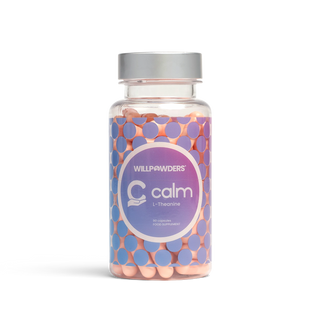

Calm Palms!
Remember, stress will interfere with what your cells do with amino acids in protein synthesis [*]. We produced Calm to help calm the brain and soothe the nerves. Feeling stressed is, well, you guessed it, stressful, and can produce a negative feedback loop in which the mind searches for reasons why the body is showing signs of feeling stressed. Our narrative making minds can believe the sky must be falling in when, in reality, we’ve had one cup of caffeinated coffee too much. Calm the caffeine jitters with L-Theanine to give yourself the chance to feel soothed.
Overall, for health, you need amino acids, there’s no getting away from it. Stress is in some ways more difficult to combat, but learning to downshift stress is a skill that can be learned.
Supportive Research Footnote:
1. CNS requirements for specific amino acids during periods of undernutrition or when individuals are exposed to highly stressful conditions may be particularly critical. For example, among moderately undernourished, but not highly stressed soldiers participating in a field test of an energy deficient ration, decrements in tryptophan were associated with impaired cognitive performance (Lieberman et al., 1997). Furthermore, a series of studies suggests that supplemental administration of tyrosine increases brain catecholaminergic neurotransmission and has beneficial effects on various behavioral parameters associated with resistance to stress (for a recent review, see Lieberman, 1994). Tyrosine is one of the dietary precursors for the synthesis of the catecholamines, dopamine and norepinephrine. The beneficial neurochemical and behavioral consequences of supplemental tyrosine administration are most readily observed when humans and other animals are exposed to various environmental and psychological stressors (Wurtman et al., 1981). [*]
Relevant Blogs

Protein Golden Balls and Protein Bollocks: Which is Which?
Now, at WillPowders, we do love a natter about protein along with the best of them. At the gym, around the workplace watering hole, on the sofa with the body...

Just Say No to Protein Powders that Pack That Crack of Spoonfuls of Sugar
Sometimes it’s more a case of what your bone broth protein powder DOESN’T contain. A spoonful of sugar (any -ose will do) shouldn’t belong there, because, if it does, you could be inviting in...

